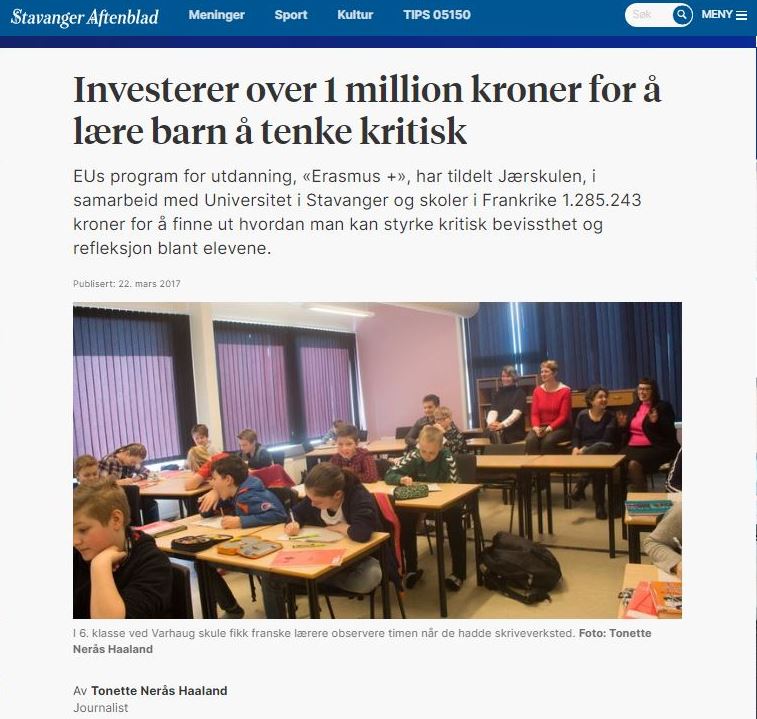Erasmus+ project “Critical Literacies and Awareness in Education” (CLAE I) had its international launch conference in Stavanger and Jæren this march
University of Stavanger, Hå municipality/Jærskulen, Dunkerque municipality, Norwegian and French schools have launched the new school development project “Critical literacies and Awareness in Education” (CLAE I). Project period: 2016-2019.
The project is co-funded by Erasmus+: the European Union Programme for Education, Training, Youth and Sport. Project type: Strategic partnership for school education (KA201).
CLAE I – is a project about the improvement of critical literacy and critical awareness in education, focusing on the following common goal: How can we improve critical literacy and awareness among pupils (12-13 years old)?
CLAE I – Project participants from Norway:
Hå municipality/ Jærskulen, University of Stavanger, Frøyland Primary School (Time municipality), Orre Primary & Secondary School (Klepp municipality), Solås Primary School (Gjesdal municipality), Varhaug Primary School (Hå municipality)
CLAE I – Project participants from France:
Dunkerque municipality, Collège Guilleminot (Dunkerque), Collège Notre Dame des Dunes (Dunkerque), Collège Van Hecke (Dunkerque), the Educational centre Gaia of the organization Le Partenariat (Lille).
CLAE I project summary:
Background:
Since the raise of the digital age at the beginning of the 2000, societies have been confronted with massive transformations in the way people communicate, get information and learn.
These societal transformations have also influenced educational systems. It has been necessary for school authorities, schools and educational practitioners to take these rapid changes into consideration. This increasing information and knowledge society affects also the teacher’s role in the classroom, the available didactical and pedagogical tools/resources, and the future teacher education and training. At the same time, a deeper reflection about what these transformations mean for learning and for the development of knowledge have been engaged. This reflection is still going on and needs more research and collaborative projects in a way to understand how these transformations should be used and integrated in schools and curricula for the improvement of learning.
The way students and pupils learn to find new information and learn to get knowledge (information literacy skill) is of extreme importance for today’s societies and educational systems. In the same way, the ways students and pupils solve problems, reflect upon the information they meet in textbooks, in digital and multimodal sources (critical literacy skill) inside and outside schools should be central issues for educators and educational systems in the future. Information and critical literacy are significant skills within the “21st Century skills and Competences” framework which has been central in several educational reforms the last years in OECD and European countries including Norway and France. These will also be central foci in this concrete collaborative project.
Objectives:
This project will aim to develop innovative critical literacy practices in the field of education by promoting transcultural cooperation at European level.
The partnership include researchers from higher education field, educational practitioners and local authorities, schools and teachers and NG- and youth organizations specialized in
the field of the education of democratic and active citizenship.
The project will focus on the development of innovative activities that enhance transversal critical literacy skills and critical awareness in education. It will more specifically aim to support and stimulate teachers and educational staff in acquiring and improving the use of multimodal (inclusive digital) technologies for learning and for the development of digital and critical competence/awareness.
The main objectives of this project will therefore be:
- To map and compare literacy practices (what kind of learning resources (”texts”) are used in the classrooms) in French and Norwegian schools
- To discuss with practitioners/teachers and others educational actors (school administrations and school leaders) the way(s) learning resources (”texts”) are used in terms of skills-development, especially focusing on digital and critical literacy skills.
- To develop innovative learning resources and activities which focus on the uses of multimodal and digital resources (“texts”) and on the relationships between teaching activities and the development of critical awareness among pupils.

